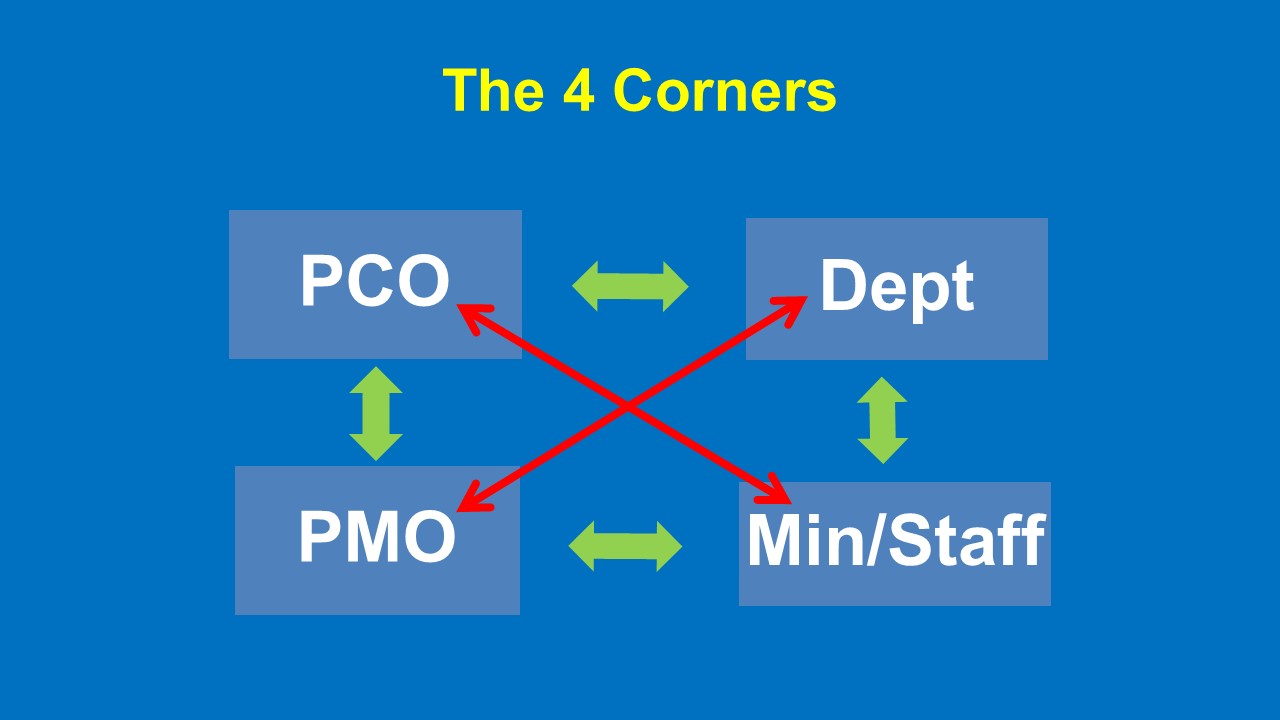I agree with critics who suggest that the government’s response thus far has been disappointing.
More concerning to me, however, is a complementary piece published a few days later by Global News’ Sam Cooper.
Cooper’s article begins:
“Three weeks before Canada’s 2019 federal election, national security officials allegedly gave an urgent, classified briefing to senior aides from Prime Minister Justin Trudeau’s office, warning them that one of their candidates was part of a Chinese foreign interference network.”
Based on my understanding of how the Canadian government works, there is something here that does not quite add up.
For the last fifteen years, Canadian governments – Conservative and Liberal – have generally aimed for what is known as a ‘four corners’ approach to managing the politics of our liberal democratic system.
(To the best of my understanding, the term ‘four corners’ was coined by a former chief of staff to Prime Minister Harper.)
Think of the four corners like this:
The lower left are partisan political staff, in this case from the Liberal Party. They work directly for the prime minister on political issues.
On the upper right are government departments and agencies. They are also made up of non-partisan public servants, like the people who work at the Canadian Security and Intelligence Service (CSIS) referred to by Cooper.
The lower right are, again, Liberal political staff, but these folks work for a minister; in Cooper’s story, Public Safety. (CSIS is one of five partner agencies within the Public Safety portfolio.)
The arrows in the diagram indicate who is supposed to speak to whom. Public servants who work in the Privy Council Office (PCO) are meant to speak with their fellow public servants in the various departments, as well as with political officials in the Prime Minister’s Office (PMO).
In addition to speaking to the PCO, political staff in the PMO are supposed to speak to political staff in ministers’ offices.
Finally, in addition to speaking to the PMO, political staff in a minister’s office are supposed to speak to public servants in the same minister’s department.
Public servants in the PCO are not supposed to reach out to political staff in individual departments – they go through the PMO.
And, more important, the PMO is not supposed to be in direct contact with departmental officials – they go through the PCO for that.
Cooper’s report suggests a meeting between CSIS (i.e., departmental) officials and the PMO. That, in itself, is not unheard of, but still not ideal.
What’s more, the report suggests that this meeting was about a Liberal Party issue. And that really confuses me.
As public servants, CSIS officials should absolutely be tracking whether our democracy is being compromised, and should report to the government (i.e., through the minister of Public Safety and the PCO) if they have concerns.
Whether such interference relates to a specific party shouldn’t matter.
Cooper seems to be suggesting that CSIS gave the PMO a private briefing about a Liberal Party issue.
If that’s the case, the minister of Public Safety has a lot of explaining to do.
For now, however, it seems to me that it is too soon to jump to conclusions. My best guess (hope?) is that CSIS briefed the PCO, not the PMO, and that the focus of the briefing was broader than just the Liberal Party.
(It is worth noting that, based on a 2019 Toronto Star report, at around the same time, CSIS was also briefing all of Canada’s major political parties separately about the threat of election interference.)
The idea that CSIS briefed the PCO is consistent with former Public Safety Minister Bill Blair’s suggestion that the government has been open about its concerns about China’s efforts to compromise our democracy.
If my hunch is correct, we’re back to the still very serious issues that Fife and Chase have raised. But if CSIS really briefed the PMO – rather than the PCO, and/or all of Canada’s major political parties – then the problem could be much bigger.
Hopefully, we’ll learn more in the coming days.
***
When I have questions about how CSIS works, I ask Carleton University’s Stephanie Carvin.
***
To be notified of my next post, follow me on Twitter @achapnick or on LinkedIn at https://www.linkedin.com/in/adam-chapnick/.
You can subscribe to my newsletter at https://buttondown.email/achapnick.

 RSS Feed
RSS Feed
